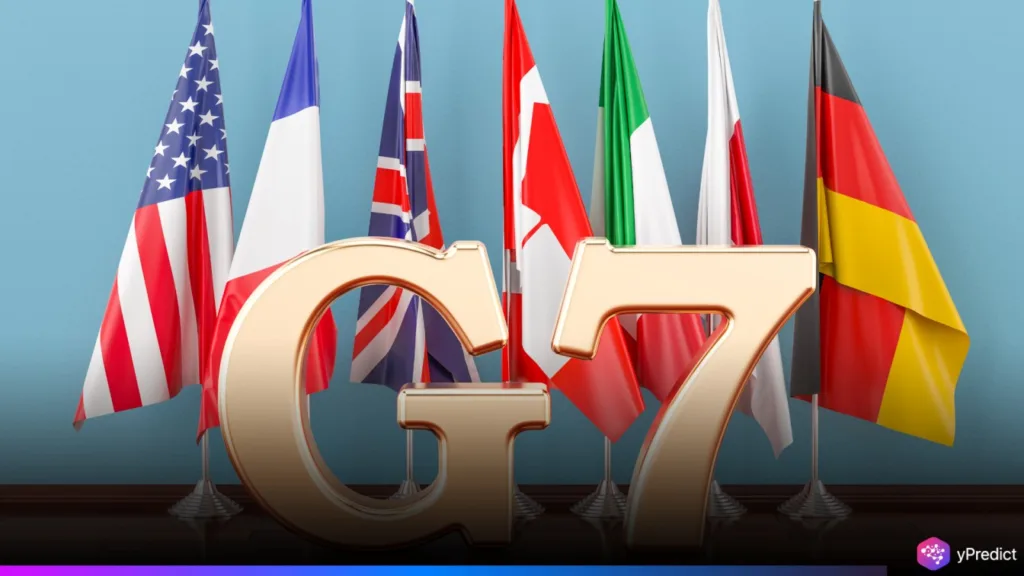
At the 2025 G7 Summit in Alberta, world leaders shifted from diplomacy to bold economic plans countering China’s tech and resource power. Amid growing fears of AI abuse and resource instability, the G7 released joint pledges on ethical AI and mineral diversification. Canada’s Mark Carney led efforts, highlighting a shift toward democratic unity and digital sovereignty amid rising global economic coercion. The G7 AI and Mineral Security summit marked a turning point, as G7 nations aligned around autonomy, resilience, and shared values in the face of pressure.
Strategic Consensus on AI Governance
Reuters reports the annual G7 summit concluded in Alberta with six joint statements addressing key global issues and emerging technologies. Leaders coordinated positions on artificial intelligence, critical minerals, quantum computing, transnational repression, wildfire preparedness, and the smuggling of migrants.
However, the summit ended without agreement on Ukraine, exposing ongoing geopolitical rifts and diverging strategies within the G7 member nations. The lack of consensus on Ukraine highlighted internal divisions, despite unified efforts on other pressing global security and technology-related concerns.
Despite prolonged negotiations, the G7 failed to issue a unified statement on Russia due to U.S. objections to strong language, citing concerns it could disrupt ceasefire talks. As a result, plans for a seventh joint declaration were dropped.
Nevertheless, the G7 AI and Mineral Security summit produced several major agreements as leaders backed a “human-centric” framework to guide responsible AI development globally. They emphasized AI’s potential to boost economic growth, strengthen governance, and improve national security across diverse industries and public systems. Leaders introduced a comprehensive roadmap for AI adoption, prioritizing public sector readiness and workforce adaptation to the technology’s disruptions.
G7 leaders voiced concerns over AI’s energy demands and job impacts but offered only voluntary guidelines, focusing instead on expanding access in developing nations. They also pledged joint investments in quantum technology to maintain a competitive edge in a field crucial to security and economic growth.
Mineral Security: Diversification and Resilience
The G7 nations also announced a unified commitment to strengthening the resilience of global critical mineral supply chains, emphasizing the urgency of the issue following China’s recent export restrictions on rare earth elements and magnets, materials crucial to sectors such as automotive, electronics, and defense.
In response, the leaders outlined a strategy focused on diversifying supply sources, advancing recycling infrastructure, and fostering responsible sourcing standards. The approach aims to reduce dependency on single suppliers and protect against potential market manipulation or geopolitical leverage.
A draft seen by Reuters calls for coordinated efforts with partners like Australia, India, and South Korea to develop secure, transparent, and sustainable mineral markets, while countering unfair trade practices to protect supply chains critical to clean energy and tech innovation.
Apart from this, recognizing the growing threat of climate-related disasters, the G7 AI and Mineral Security summit launched a new international wildfire cooperation charter. Signed not only by G7 nations but also by Australia, India, Mexico, South Africa, and South Korea, the agreement aims to improve disaster prevention, response, and post-fire recovery through shared expertise and joint action.
Conclusion
Although the summit ended without a full closing communiqué, standard practice in previous years, G7 leaders stressed the need for unity amid rising geopolitical and technological challenges. French President Emmanuel Macron commended Canada’s leadership, noting that Carney successfully preserved group cohesion despite unresolved issues.
Looking ahead, Prime Minister Carney and U.K. Prime Minister Keir Starmer have committed to strengthening AI research ties. Canada will also launch “Rapid Solution Labs” to drive public sector AI innovation. Talks on a U.S.-Canada economic and security agreement are expected to advance within 30 days.
Though this year’s summit highlighted divisions on key global issues, it reinforced G7 members’ shared intent to navigate a rapidly evolving world order through collaborative action, where possible, and resilience where consensus proves elusive.






